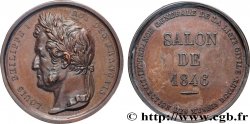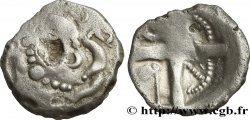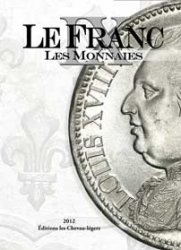E-auction 588-547100 - fme_936069 - LOUIS-PHILIPPE I Médaille, Député du Morbihan
You must signin and be an approved bidder to bid, LOGIN TO BID. Accounts are subject to approval and the approval process takes place within 48 hours. Do not wait until the day a sale closes to register. Clicking on « bid » constitutes acceptance of the terms of use of cgb.fr private e-auctions.
Bids must be placed in whole Euro amounts only. The sale will start closing at the time stated on the item description; any bids received at the site after the closing time will not be executed. Transmission times may vary and bids could be rejected if you wait until the last second. For further information ckeck the E-auctions F.A.Q.
NO BUYER'S FEE.
NO BUYER'S FEE.
| Estimate : | 120 € |
| Price : | 19 € |
| Maximum bid : | 49 € |
| End of the sale : | 22 July 2024 20:38:20 |
| bidders : | 3 bidders |
Type : Médaille, Député du Morbihan
Date: 1844
Mint name / Town : 56 - Morbihan
Metal : copper
Diameter : 26,5 mm
Orientation dies : 12 h.
Engraver BORREL Maurice Valentin (1804-1882)
Weight : 10,09 g.
Edge : lisse + Proue CUIVRE
Puncheon : Proue CUIVRE
Coments on the condition:
Présence de petits coups et de trace d’usure
Obverse
Obverse legend : MIS DE LA ROCHEJAQUELEIN - DÉPUTÉ DU MORBIHAN.
Obverse description : Portrait du marquis à gauche, la chevelure abondant et les favoris marqués.
Reverse
Reverse legend : AU / DÉPUTÉ / DU / MORBIHAN / MDCXXXXII / MDCXXXXIII / ET / MDCXXXXIV.
Reverse description : Légende en huit lignes.
Commentary
Henri-Auguste-Georges du Vergier de La Rochejaquelein (château de Citran, Gironde, le 28 septembre 1805 - 7 janvier 1867) était un homme politique français. Son père Louis du Vergier de La Rochejaquelein et son oncle Henri comptent parmi les plus célèbres des généraux royalistes qui ont combattu pendant la guerre de Vendée.
Il entre à l'École militaire de Saint-Cyr en 1823, et devient officier des grenadiers à cheval de la Garde. Il prend part à l'expédition d'Espagne de 1823 et à la guerre russo-turque de 1828-1829. Il fut officier de la Légion d'honneur, chevalier de 4e classe de l'Ordre de Sainte-Anne, chevalier de 4e classe de l'Ordre de Saint-Vladimir.
Membre de la Chambre des pairs dès 1825, il démissionne après la révolution de juillet 1830 et l'accession au trône de Louis-Philippe, qui appartient à la branche cadette de la maison de Bourbon. Il est élu député du Morbihan en 1842, et siège à droite, parmi les légitimistes.
En 1848, la Gazette de France soutient sa candidature à l'élection présidentielle, mais il n'obtient qu'un nombre de votes insignifiant. Fait sénateur par Napoléon III en 1852, au grand étonnement des autres légitimistes, il défend ardemment le catholicisme ; sa nomination au Sénat peut peut-être s'expliquer par ses positions en matière de politique extérieure, où il se montre moins intransigeant sur la question romaine : il soutient d'ailleurs toujours la politique impériale dans ce domaine..
Henri-Auguste-Georges du Vergier de La Rochejaquelein (Citran Castle, Gironde, 28 September 1805 – 7 January 1867) was a French politician. His father Louis du Vergier de La Rochejaquelein and his uncle Henri are among the most famous royalist generals who fought during the War in the Vendée..
He entered the Saint-Cyr Military School in 1823, and became an officer in the Horse Grenadiers of the Guard.. He took part in the Spanish expedition of 1823 and in the Russo-Turkish War of 1828-1829.. He was an officer of the Legion of Honour, a 4th class knight of the Order of Saint Anne, and a 4th class knight of the Order of Saint Vladimir..
A member of the House of Peers from 1825, he resigned after the July Revolution of 1830 and the accession to the throne of Louis-Philippe, who belonged to the younger branch of the House of Bourbon.. He was elected deputy of Morbihan in 1842, and sat on the right, among the legitimists..
In 1848, the Gazette de France supported his candidacy for the presidential election, but he obtained only an insignificant number of votes.. Made a senator by Napoleon III in 1852, to the great astonishment of the other legitimists, he ardently defended Catholicism; his appointment to the Senate can perhaps be explained by his positions on foreign policy, where he was less intransigent on the Roman question: he still supported imperial policy in this area..
Il entre à l'École militaire de Saint-Cyr en 1823, et devient officier des grenadiers à cheval de la Garde. Il prend part à l'expédition d'Espagne de 1823 et à la guerre russo-turque de 1828-1829. Il fut officier de la Légion d'honneur, chevalier de 4e classe de l'Ordre de Sainte-Anne, chevalier de 4e classe de l'Ordre de Saint-Vladimir.
Membre de la Chambre des pairs dès 1825, il démissionne après la révolution de juillet 1830 et l'accession au trône de Louis-Philippe, qui appartient à la branche cadette de la maison de Bourbon. Il est élu député du Morbihan en 1842, et siège à droite, parmi les légitimistes.
En 1848, la Gazette de France soutient sa candidature à l'élection présidentielle, mais il n'obtient qu'un nombre de votes insignifiant. Fait sénateur par Napoléon III en 1852, au grand étonnement des autres légitimistes, il défend ardemment le catholicisme ; sa nomination au Sénat peut peut-être s'expliquer par ses positions en matière de politique extérieure, où il se montre moins intransigeant sur la question romaine : il soutient d'ailleurs toujours la politique impériale dans ce domaine..
Henri-Auguste-Georges du Vergier de La Rochejaquelein (Citran Castle, Gironde, 28 September 1805 – 7 January 1867) was a French politician. His father Louis du Vergier de La Rochejaquelein and his uncle Henri are among the most famous royalist generals who fought during the War in the Vendée..
He entered the Saint-Cyr Military School in 1823, and became an officer in the Horse Grenadiers of the Guard.. He took part in the Spanish expedition of 1823 and in the Russo-Turkish War of 1828-1829.. He was an officer of the Legion of Honour, a 4th class knight of the Order of Saint Anne, and a 4th class knight of the Order of Saint Vladimir..
A member of the House of Peers from 1825, he resigned after the July Revolution of 1830 and the accession to the throne of Louis-Philippe, who belonged to the younger branch of the House of Bourbon.. He was elected deputy of Morbihan in 1842, and sat on the right, among the legitimists..
In 1848, the Gazette de France supported his candidacy for the presidential election, but he obtained only an insignificant number of votes.. Made a senator by Napoleon III in 1852, to the great astonishment of the other legitimists, he ardently defended Catholicism; his appointment to the Senate can perhaps be explained by his positions on foreign policy, where he was less intransigent on the Roman question: he still supported imperial policy in this area..








 Report a mistake
Report a mistake Print the page
Print the page Share my selection
Share my selection Ask a question
Ask a question Consign / sell
Consign / sell
 Full data
Full data















